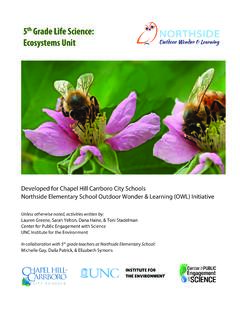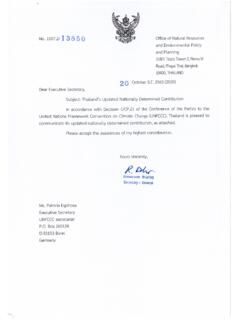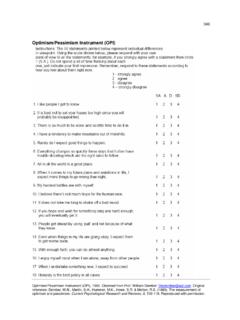Transcription of STAKEHOLDERS’ PERCEPTIONS OF CLIMATE CHANGE AND …
1 STAKEHOLDERS PERCEPTIONS OF CLIMATE CHANGE AND ATTITUDES TOWARD RECOMMENDED GREENHOUSE GAS REDUCTION STRATEGIES IN CHATHAM COUNTY Grace Buie, Jack Cordes, Alex Crawford, Laura Diez, Emily Drake, Gunnar Nagle, Claire Nelson, and Francesca Peay In fulfillment of the requirements of ENEC 698 Course Instructor: Dr. Lama BouFajreldin University of North Carolina at Chapel Hill May 2017 i TABLE OF CONTENTS List of Tables ..ii List of Figures ..iii Executive Summary ..iv Introduction ..1 Literature Review ..3 Results ..22 Conclusions and Recommendations ..31 References ..35 ii LIST OF TABLES Table 1.
2 Weighted Sample Distribution of Local Residents in Incorporated and Unincorporated Areas of Chatham County ..19 Table 2. Distribution of Interviews by stakeholder Group ..20 Table 3. Attitudes of Participants of Chatham County s Local Governments toward Recommended GHG Reduction Strategies ..23 Table 4. Attitudes of Participants of Chatham County s Transportation Sector toward Recommended GHG Reduction Strategies ..27 Table 5. Attitudes of Participants of Chatham County s Livestock Farmers toward Recommended GHG Reduction Strategies ..29 iii LIST OF FIGURES Figure 1. Population Distribution in Chatham County.
3 12 Figure 2. Chatham County Population Pyramid ..13 Figure 3. Percent of Population over 65 Years ..13 Figure 4. Ethnicity in Chatham County ..14 Figure 5. Geographic Distribution of the Hispanic Population in Chatham County ..14 Figure 6. Geographic Distribution of the Black Population in Chatham County ..15 Figure 7. Geographic Distribution of the White Population in Chatham County ..15 Figure 8: 2010 and 2015 Greenhouse Gas Emissions from Chatham County s Residential, Commercial, Industrial, Transportation, and Agricultural Sectors ..17 iv EXECUTIVE SUMMARY In the Fall of 2016, a greenhouse gas emissions inventory for Chatham County was developed by Joca and Kolosna (2016) from the Department of City and Regional Planning at the University of North Carolina at Chapel Hill.
4 This inventory looked at emissions from five major sectors: county residents, local government, industry and commercial, agriculture, and transportation. This inventory will be used by the CLIMATE CHANGE Advisory Board of Chatham County along a series of CLIMATE CHANGE mitigation strategies recommended by the committee to reduce greenhouse gas emissions in the county. This study was conducted to try to gauge responses to the recommended CLIMATE CHANGE mitigation strategies, and to explore PERCEPTIONS of participants representing the five stakeholder groups in relation to CLIMATE CHANGE . Semi-structured phone interviews were conducted with 11 participants representing these stakeholder groups.
5 Results revealed that stakeholders definitions of CLIMATE CHANGE varied considerably, from a global process affected by human activities/emissions to an occurrence in nature that affects global temperatures. Some of the participants believed that CLIMATE CHANGE had an effect on the global scale, but some were unaware of CLIMATE CHANGE impacts on Chatham County or to what degree Chatham County was contributing to CLIMATE CHANGE in terms of its greenhouse emissions. As for attitudes toward recommended CLIMATE CHANGE mitigation strategies, this study revealed common concerns among representatives of the county s local governments regarding these strategies.
6 These concerns included that local governments do not have enough power to be able to effectively implement carbon emission reduction strategies, and that the financial costs and the time of implementation of the strategies were not worth their benefits, as CLIMATE CHANGE was not thought to be an imminent threat to local municipalities in Chatham County. For the v participants representing the agricultural sector, the recommendations were generally found to be vague, misleading, and irrelevant to current standard operating practices. For the participants representing the transportation sector, density disparity was cited as a common reason against implementing greenhouse gas emission reduction strategies as it would not be effective in areas where the population is extremely spread out.
7 Findings from this study reflect the need to form recommendations with the input of the relevant stakeholders. Our compiled interviews showed that stakeholder s primary concerns were cost and time efficiency. Stakeholders were much more responsive to recommendations that decreased their cost and time of operation. Stakeholders also expressed a desire to have proof that the recommendations are net carbon negative before they were willing to implement them. Lastly, stakeholders felt that the recommendations needed to be more specific in terms of who specifically needs to implement the strategies, more specific actions to take and what enforcement mechanisms would be in place.
8 In addition to those concerns, many of the recommendations were already in place or were impossible to put in place due to legal constrictions or impracticality. The relevant stakeholders opinions need to be considered in order to form practical, feasible, and realistic recommendations. 1 INTRODUCTION In the Fall of 2016, an inventory of greenhouse gas emissions for Chatham County was developed by Joca and Kolosna (2016) from the Department of City and Regional Planning at the University of North Carolina at Chapel Hill. This inventory looked at emissions from five major sectors: Chatham County residents, local governments, industry and commercial, agriculture, and transportation.
9 This inventory will be used by the CLIMATE CHANGE Advisory Board of Chatham County along a series of CLIMATE CHANGE mitigation strategies recommended by the committee to reduce greenhouse gas emissions in the county. Effective planning and implementation of CLIMATE CHANGE mitigation and adaptation strategies, however, necessitates engaging a range of stakeholders; people or groups who influence or are influenced (Carney et al., 2009, p. 4) by these strategies. stakeholder engagement is thought to: (a) help maintain the policy relevance of the research, (b) to provide legitimacy to the information gathered for the research, (c) give credibility to the research, and (d) directly help inform policy (Carney et al.)
10 , 2009, p. 6). Within the context of CLIMATE CHANGE mitigation, effective stakeholder engagement would be attained by acknowledging stakeholders attitudes toward CLIMATE CHANGE mitigation strategies and socio-cognitive factors that shape people s behaviors and ability to adapt to CLIMATE CHANGE (Grothmann & Patt, 2005). This study is a stakeholder engagement exercise that made use of the containment or managerial stakeholder engagement approach; in which stakeholder opinions were sought on predefined strategies in a consultative manner (Few et al., 2007, p. 53). Specifically, this study explored PERCEPTIONS of CLIMATE CHANGE and attitudes towards recommended CLIMATE CHANGE mitigation strategies among five Chatham County stakeholder groups; namely, the county residents, local governments, industrial and commercial sector, agriculture sector, and 2 transportation sector.








